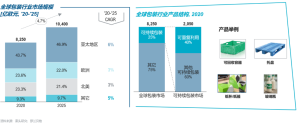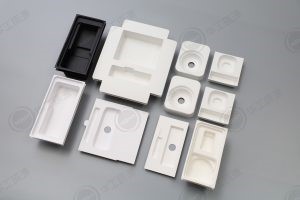News
The global sustainable packaging market is developing rapidly, and the impact of packaging waste on the ecosystem has become a topic of common concern worldwide, with the importance of sustainable packaging becoming increasingly prominent. According to the latest statistics for 2021:
● The number of plastic bottles consumed globally is approximately 1.2 million per minute, an increase of 20% compared to 2020
●12 million tons of plastic enter the oceans every year, with a huge impact on marine ecology
● Only 14% of plastic packaging is recycled globally, with the remaining 15% incinerated and 70% remaining in the natural environment.
In response to the packaging waste problem, sustainable packaging has seen rapid growth over the past few years, with the global sustainable packaging market reaching approximately €205 billion, or 25% of the overall packaging market.

Strengthening of global environmental policies, rising consumer awareness, and increasing number of companies practicing sustainable development strategies are driving the growth of the sustainable packaging market.
Global environmental policies continue to intensify: In 2021, Australia announced its National Plastics Plan, which aims to ban the use of single-use plastics by 2025. In addition to Australia, a growing number of countries and cities around the world are taking action to ban single-use plastics. In the European Union, the 2019 Single-Use Plastics Directive aims to combat the 10 most common single-use plastic items on European beaches, which account for 70 percent of all marine litter in the EU. In the United States, states such as California, Hawaii and New York have begun to legislate against single-use plastics such as plastic bags, forks and food containers. In Asia, countries such as Indonesia and Thailand have led the call for measures to ban single-use plastics.
Consumers are becoming more environmentally conscious and willing to pay for sustainable packaging: A worldwide consumer survey showed that 67% of respondents believe recyclable packaging is important, and 64% consider packaging with recycled content to be a priority in their purchasing decisions. In addition, younger consumers are more likely to buy sustainable packaging than older ones, with 83 percent of respondents aged 44 and under willing to pay more for sustainable packaging.
More Consumer Goods Companies Emphasize Sustainability in Business Development: Along with increased policy pressures and heightened consumer awareness of environmental protection, more and more global headline consumer goods companies have developed corresponding sustainability strategies, hoping to reduce carbon emissions from all aspects of the supply chain, manufacturing, logistics and distribution.
What was once known as the e-commerce boom has now become a consumer lifestyle. in 2020, digital retail sales in the United States surpassed $844 billion, and by 2022, e-commerce is expected to become a trillion-dollar industry as the lasting impact of the pandemic permanently alters consumer behavior. While the omni-channel approach to retail offers consumers more convenience and choice, the accelerated growth of e-commerce has led to an urgent need for packaging materials and is putting pressure on the supply chain and the environment. The result is higher prices, more energy use, and more waste involving paper and plastic packaging. Overall, these impacts are exacerbating sustainability issues that cannot be ignored.

In 2018, the U.S. Environmental Protection Agency estimated that more than 30 million tons of packaging ended up in landfills, and recycling only reduces a portion of the waste and doesn't even come close to addressing the problem fully. According to the Environmental Defense Fund's Center for Supply Chain Solutions, only 9 percent of plastic waste is properly recycled. Other studies have found that 67 percent of manufacturers provide incorrect recycling information on their labels. The impact of these shortcomings is devastating - images of trash spilling into landfills and oceans immediately come to mind - but less visual impacts include the large carbon footprint of packaging production and the heavier weights of packaging that generate significant emissions during the "last mile" of the supply chain. The supply chain of packaging weights.
As countries around the world on all areas of production and application process of environmental protection requirements are increasingly high, by virtue of the production and manufacturing process of environmentally friendly, wide range of applications, more mature compared to other green materials and other advantages, plant fiber molded packaging than degradable plastics, bioplastic packaging products, become the leading packaging industry under the ban on plastic wind mouth.
After years of precipitation and development, plant fiber molded plastic packaging materials are gradually expanding to food, drugs, cosmetics, toys, home appliances, electronic products and other fields, to replace the traditional plastic foam, plastic lining and other packaging materials.
Specifically, plant fiber molded packaging materials have the following advantages:
Environmentally sustainable development
Plant fiber molding packaging is a three-dimensional paper technology. It takes bagasse and other plant fiber materials as raw materials, and is shaped into certain shapes of paper products by special molds on plant fiber molding equipment.
Due to the use of recycled materials in the production process, this type of packaging reduces its carbon footprint, the manufacturing process does not release high carbon emissions, and ensuring environmental safety is a major benefit of its use.
Biodegradable
Plant fiber molded plastic packaging is also highly biodegradable, in addition to reducing its carbon footprint, plant fiber molded plastic packaging is compostable, naturally degradable, and at the end of its use, plant fiber molded plastic packaging will quickly decompose and break down completely to become part of the soil.
Additionally plant fiber molded packaging is non-toxic because it is biodegradable and made from non-allergenic materials, whereas traditional packaging materials are made from petrochemicals and synthetic materials that pollute the environment and release toxic gases on contact with heat.
Plant fiber molded packaging is reusable
The environmentally friendly materials used to make it allow it to be reused after it has reached the end of its life. Plant fiber molded packaging can be reused to produce other environmentally friendly product packaging for a variety of industries.

Reduced Costs
Plant fiber molded packaging is smaller and lighter than styrofoam and can be overlapped, reducing excess space. This greatly reduces packaging waste, which in turn reduces overhead and transportation costs.
Plant fiber molded plastic packaging to enhance corporate image
The development and application of plant fiber molded plastic packaging has become an inevitable trend of social development, these products will also play a vital role in the development of all areas of society, with its social, economic, artistic, non-polluting, simple process and other advantages, it will certainly play a role in the protection of the natural environment, improve the living environment and other aspects.
At the same time as a commodity, it has a very broad market space and development prospects, will contribute to the promotion of economic development!
 +86 189 2452 1063
+86 189 2452 1063 s-dzhiyuan@163.com
s-dzhiyuan@163.com 18924521063
18924521063




Online Message

Follow Us


Top